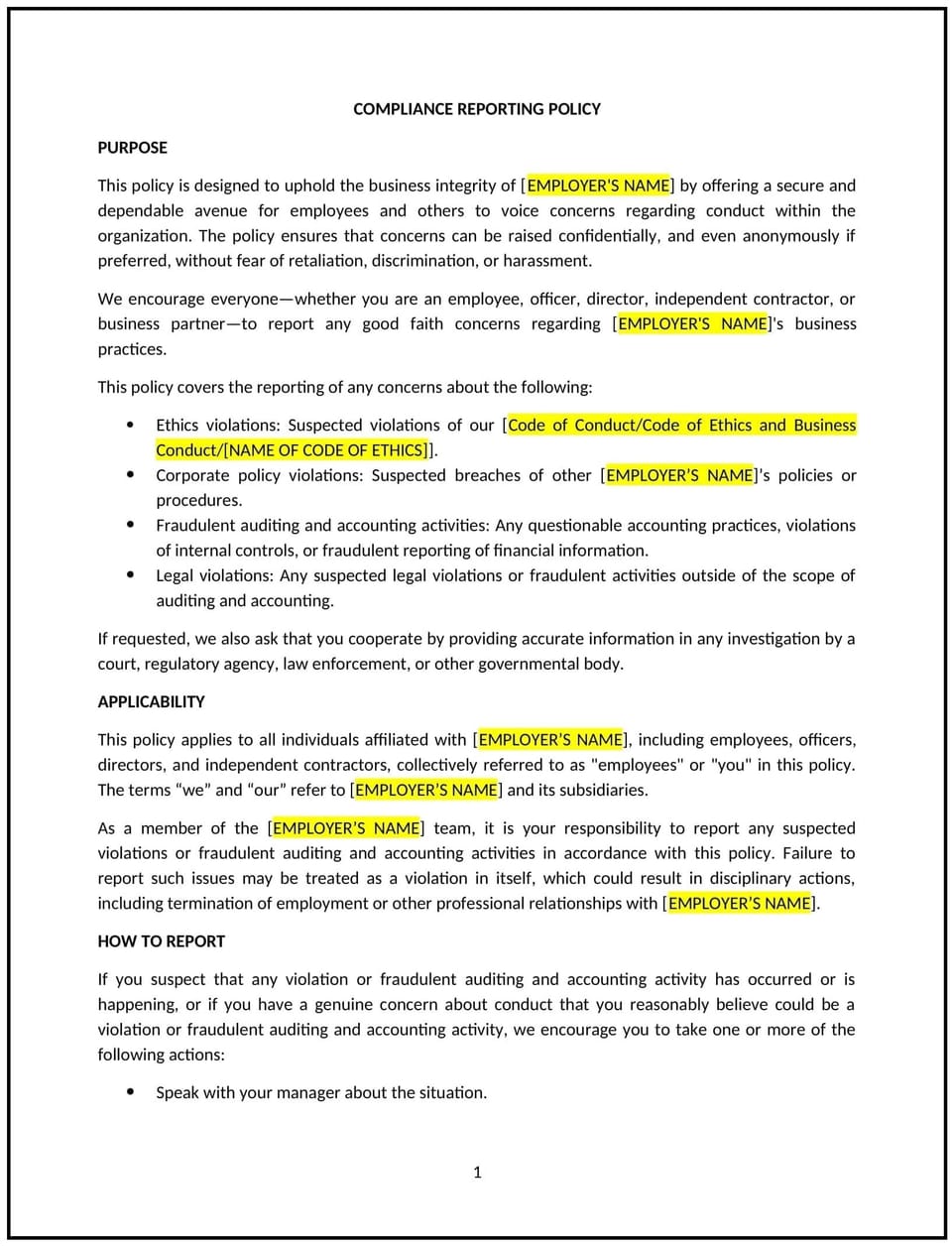Compliance reporting policy (Missouri): Free template

Compliance reporting policy (Missouri)
A compliance reporting policy helps businesses in Missouri establish clear procedures for reporting and addressing compliance issues within the organization. This policy outlines the steps employees should follow when they encounter any potential violations of laws, regulations, or company policies. It is designed to promote transparency, accountability, and a culture of integrity in the workplace.
By adopting this policy, businesses in Missouri can create a structured approach to handling compliance concerns, minimize legal risks, and maintain a strong ethical standing within the industry.
How to use this compliance reporting policy (Missouri)
- Define reporting procedures: Clearly specify how employees should report compliance issues, including who to contact, how to submit concerns (e.g., through a hotline, email, or in-person), and what information should be provided.
- Ensure confidentiality: Outline measures to protect the confidentiality of employees who report concerns, ensuring they are not subject to retaliation or discrimination.
- Set timelines: Establish timelines for reporting and addressing compliance issues, including response times for investigations and resolutions.
- Encourage reporting of concerns: Create an environment where employees feel comfortable reporting issues by promoting a culture of openness and trust.
- Provide training: Offer regular training on compliance policies and reporting procedures to ensure employees are aware of their responsibilities and know how to report violations.
- Address retaliation: Clearly state that any retaliation against employees who report compliance issues will not be tolerated, and outline the consequences for those found retaliating.
- Define resolution process: Specify the steps for addressing reported compliance issues, including investigation, corrective action, and communication of the resolution to the employee who reported the issue.
- Review regularly: Periodically review the policy to ensure it is effective, up-to-date with Missouri regulations, and aligned with company needs.
Benefits of using this compliance reporting policy (Missouri)
This policy provides several benefits for businesses in Missouri:
- Mitigates legal risk: Establishing a clear compliance reporting process helps reduce the likelihood of legal violations and ensures the company adheres to relevant laws and regulations.
- Fosters a culture of accountability: By encouraging employees to report issues, businesses can address concerns proactively, promoting a culture of integrity and ethical behavior.
- Protects employees: A clear anti-retaliation clause helps ensure that employees feel safe reporting issues without fear of negative consequences.
- Enhances operational transparency: Reporting mechanisms improve transparency in the organization, ensuring that compliance concerns are addressed openly and fairly.
- Supports regulatory requirements: Adopting a structured reporting policy helps businesses stay in line with both Missouri state laws and federal regulations that require reporting mechanisms for compliance issues.
- Builds trust with stakeholders: By demonstrating a commitment to ethical practices, businesses can build trust with clients, customers, and other stakeholders, enhancing their reputation.
Tips for using this compliance reporting policy (Missouri)
- Communicate the policy clearly: Ensure all employees are aware of the reporting process, including their role in identifying and reporting compliance issues, through onboarding and training.
- Create multiple reporting channels: Offer different reporting options to accommodate employee preferences, including anonymous options for those who may be hesitant to come forward.
- Address issues promptly: Ensure that all reported compliance issues are addressed quickly and transparently, with clear follow-up actions and timelines.
- Maintain confidentiality: Protect the identity of employees who report compliance issues, and ensure that their concerns are handled with discretion and professionalism.
- Foster a non-retaliatory environment: Make it clear that any retaliation against employees who report compliance issues will result in disciplinary action.
- Review the policy regularly: Periodically assess the policy's effectiveness in promoting transparency, reporting, and resolving compliance issues, and make updates as necessary.
Q: Why should businesses in Missouri adopt a compliance reporting policy?
A: Businesses should adopt this policy to provide a clear and structured approach for employees to report compliance issues, reduce legal risks, and foster an ethical and transparent work environment.
Q: How should employees report compliance issues?
A: Businesses should establish clear reporting channels, such as a dedicated hotline, email, or in-person reporting, specifying how employees should submit their concerns and what information they should provide.
Q: What protections are in place for employees who report compliance issues?
A: Businesses should ensure that employees who report compliance concerns are protected from retaliation or discrimination, and should clearly define the consequences for any retaliatory actions.
Q: How should businesses handle reported compliance issues?
A: Businesses should have a defined process for investigating and addressing compliance concerns, including assigning responsibility for handling reports, conducting investigations, and communicating resolutions to employees.
Q: How can businesses encourage employees to report compliance issues?
A: Businesses should create a culture of trust and transparency, where employees feel safe and supported in reporting concerns, and where the process is clear and easily accessible.
Q: How often should businesses review the compliance reporting policy?
A: Businesses should review the policy regularly to ensure it remains effective, up-to-date with Missouri laws, and aligned with company practices, making necessary adjustments as needed.
Q: What happens if an employee faces retaliation after reporting a compliance issue?
A: Businesses should specify that any form of retaliation is strictly prohibited and outline the disciplinary actions that will be taken if retaliation is reported.
This article contains general legal information and does not contain legal advice. Cobrief is not a law firm or a substitute for an attorney or law firm. The law is complex and changes often. For legal advice, please ask a lawyer.


